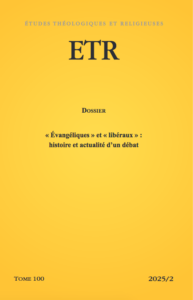Cette étude s’attache à identifier les traces d’une eschatologie dans la philosophie politique de Nicholas Wolterstorff, plus particulièrement dans sa théorie de la justice. Dans un premier temps, la recherche présente cet auteur et ses interactions avec d’autres philosophes du monde anglo-américain, principalement en ce qui concerne la place de la religion dans l’espace public des démocraties libérales. Ce contexte est fondamental pour comprendre la pertinence de Wolterstorff dans la philosophie morale et politique de langue anglaise au cours des dernières décennies. On présente ensuite l’école de pensée à laquelle il est rattaché, le néo-calvinisme, en montrant ses origines néerlandaises ainsi que son développement en Amérique du Nord, en Afrique du Sud et en France. Dans un troisième temps, on met en évidence le type d’eschatologie qui s’est développé dans le milieu protestant américain, qui s’articule principalement dans les différentes positions sur l’interprétation d’Apocalypse 20, et comment cela sert de cadre théologique pour présenter, par la suite, les traces d’une eschatologie dans l’exégèse des écritures bibliques par Wolterstorff. La thèse établit un pont entre cette exégèse et l’articulation d’une proposition théiste sur les droits naturels, qui se décline en droits humains et droits des entités non humaines ; elle rend également compte des réactions critiques à cette théorie. Dans le septième chapitre, on présente l’interaction de son cadre théorique avec les questions pratiques à travers quatre thèmes sur lesquels Wolterstorff a écrit et dans lesquels il a plus ou moins assumé un engagement militant ; un accent particulier est mis sur sa défense du mariage entre couples de même sexe, qui représente une rupture majeure avec sa tradition, ainsi que sur les réactions qu’elle a suscitées dans son milieu. On conclut par des remarques critiques, concernant principalement sa théorie de la justice ainsi que son application aux questions pratiques abordées dans le dernier chapitre.
Mots-clés : théorie de la justice, shalom, eschatologie, philosophie politique, Nicholas Wolterstorff, démocratie libérale, néo-calvinisme, Apocalypse 20, droit
Justice towards shalom. Traces of eschatology in the political philosophy of Nicholas Wolterstorff
This study seeks to identify traces of eschatology in Nicholas Wolterstorff’s political philosophy, particularly in his theory of justice. The study begins by presenting Wolterstorff and his interactions with other philosophers in the Anglo-American world, particularly with regard to the place of religion in the public sphere of liberal democracies. This context is fundamental to understanding Wolterstorff’s relevance to English-language moral and political philosophy in recent decades. We then present the school of thought to which he belongs, neo-Calvinism, showing its Dutch origins as well as its development in North America, South Africa and France. Thirdly, the type of eschatology that developed in the American Protestant milieu is highlighted, articulated principally in the different positions on the interpretation of Revelation 20, and how this serves as a theological framework for presenting, subsequently, the traces of an eschatology in Wolterstorff’s exegesis of the biblical scriptures. The thesis builds a bridge between this exegesis and the articulation of a theistic proposal on natural rights, which is broken down into human rights and the rights of non-human entities; it also gives an account of the critical reactions to this theory. In the seventh chapter, the interaction of his theoretical framework with practical issues is presented through four themes on which Wolterstorff has written and in which he has more or less assumed a militant commitment; particular emphasis is placed on his defence of marriage between same-sex couples, which represents a major break with his tradition, and on the reactions it has provoked in his milieu. We conclude with some critical remarks, mainly concerning his theory of justice and its application to the practical issues discussed in the last chapter.
Keywords: theory of justice, shalom, eschatology, political philosophy, Nicholas Wolterstorff, liberal democracy, neo-Calvinism, Revelation 20, law
p. 221-231
Auteur
DAVID Gonzalo
David GONZALO est Pasteur de l'Église presbytérienne du Chili / Postdoctorant au Neo-Calvinism Research Institute.
